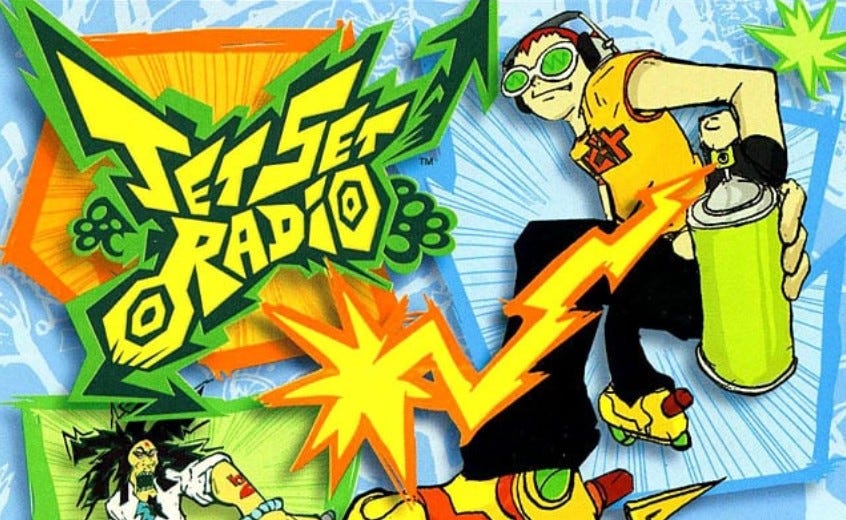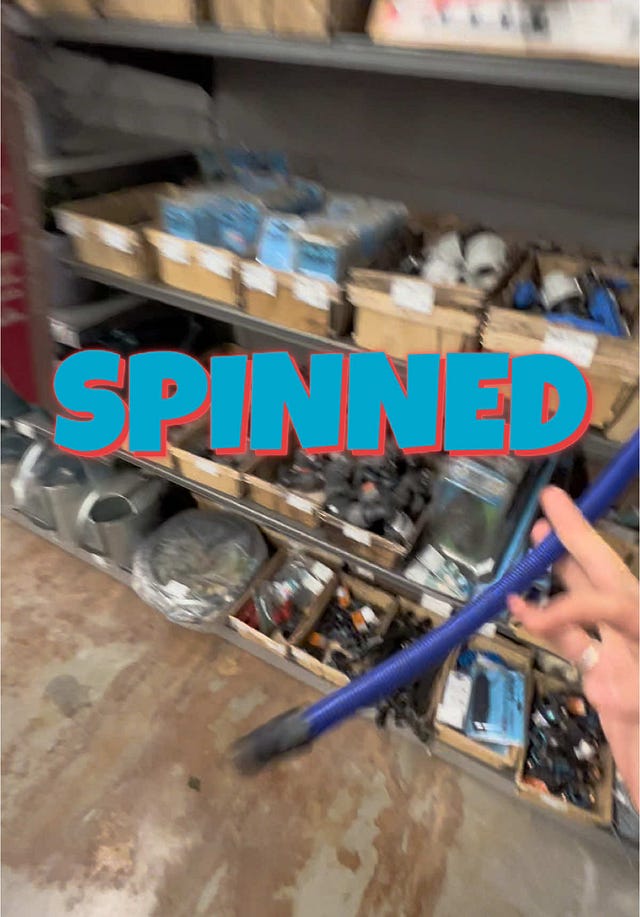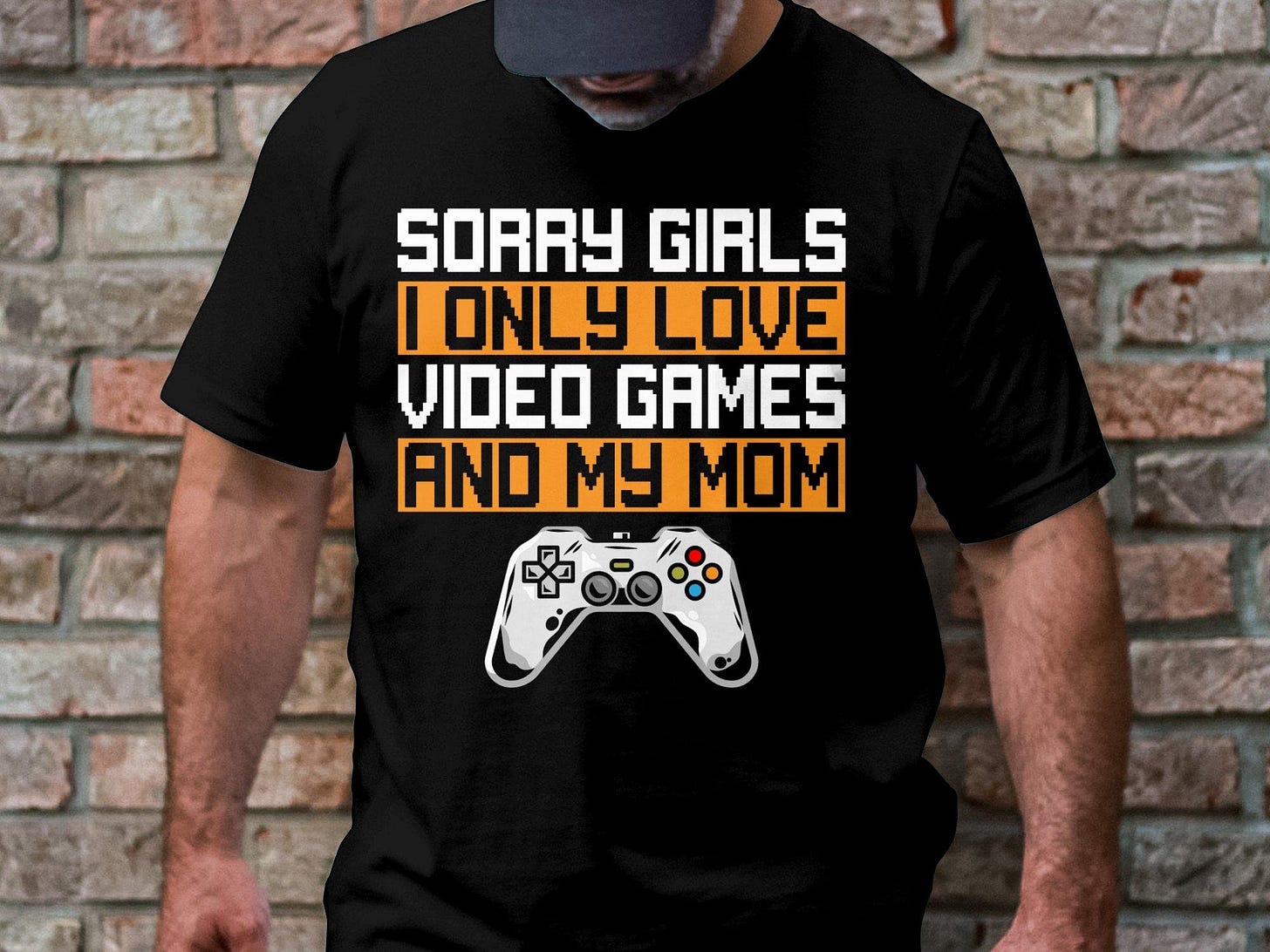I wrote most of this on a plane over to San Francisco for Game Developers Conference. I needed to get some confidence for all that networking so I decided to dig into an extremely too-cool-for-school game so people know what’s up.
I’m sure we all know people that tell us they like a certain type of music just to look cool. I think people do this with video games too. I believe the brand of a game will eventually become important enough to positively influence its play time…we will see.
We All Know And Love Jet Set Radio <3
Jet Set Radio In Recent Culture.
The Psychology Of Recent Culture.
Becoming The ‘Gucci’ Of Legacy Gaming Music.
1. We All Know And Love Jet Set Radio <3
Okay okay I’m sure I don’t even need to give an intro to this game because we all know it, even if we haven’t played it…right? Well you’re getting one anyway.
Jet Set Radio is a game released in the year 2000 where you play as a member of a gang of graffiti-tagging inline skaters. Gameplay involves traversing a Shibuya-inspired section of ‘Tokyo’, listening to an underground radio station, spraying graffiti, coaxing rival gangs and dodging the police.
In 2025 that description alone comes with a built-in OFCOM complaint - back then, this was the kind of street fantasy that gave teenagers a reason to stay in, shaping their music tastes and laying down a gaming legacy. Aesthetically through both the music and the cel-shaded designs, this game is the definiton of late 90’s counter-culture.
It won a bag of awards when it was released and has been hailed as a cult classic that was ahead of its time. Yet despite the critical acclaim, its commercial performance was modest - selling only 40,000 copies in its first week, with the 2003 sequel Jet Set Radio Future moving 80,000 in its first 6 months, likely impacted by the Dreamcast’s waning presence in global markets.
Since then, across all versions of the game combined, including the original and re-releases, sales of Jet Set Radio surpassed 1 million copies worldwide. This is a respectable recovery, but it still seems to be held in higher regard despite its sales.
I spotted an article from the game creative director Masayoshi Kikuchi that is worth noting for this substack:
“When I saw PaRappa The Rapper at TGS… I think that’s the first game with pop culture like that. They did it first. After that I decided to make a true game, not just a visual experience, that was actually for adults.”
A true game for adults…led by a team of 25 people who were mostly under the age of 25. Let’s keep this in mind.
The music is the real stand out for this game because it is instantly recognisable. A massive shout out to Hideki Naganuma, the mastermind behind the OST and the creator of this trademark sound you can hear into other games including Ollie King, Sonic Rush and many many more.
The narrator of the game, as well as the host of the pirate radio station, is a character named DJ Professor K - probably one of the coolest characters in video game history. The music of Jet Set Radio plays a key role in cementing its pop culture status, blending Trip-Hop, Funk, and Electronic Dance, with American versions of this game containing Rock.
Look, you’ll need to check this out for yourself because the combination of innovative gameplay, art design, characters dripping with personality and most importantly a soundtrack that gels it all together goes above and beyond its aim, and I believe it’s instantly-recognisable soundtrack is what created its legacy.
2. Jet Set Radio In Recent Culture
I’m a bit of a digital hoarder, and curate all my playlists into folders. Don’t diagnose me please. I also do this for TikTok videos that I like. Have I ever gone back to look into some of these folders? No. But you never know!
I’ve made a ‘collection’ on TikTok called ‘Gaming Utility’. It was actually loosely based on a 4-part Substack series, which ended up becoming ‘Gamemotifs’. Now, I use this folder to save any videos that I feel merges popular culture with gaming.
Anyway, one trend which that has been really entertaining me are these videos of people spinning items on their hand, layering it with Jet Set Radio sound effects.
 Tiktok failed to load.
Tiktok failed to load.Enable 3rd party cookies or use another browser
1.3m likes. Many, many videos with this sound effect - And you’ll notice a heap of top comments like this:
This is really interesting to me, not just because those spins are damn impressive! It always seems to be a top comment where someone is commenting their excitement to hear a Jet Set Radio sound effect. Surely this game’s cultural impact needs to be studied.
3. The Psychology Of Recent Culture.
On Spotify there is a feature called ‘Friends Activity’ where people can see what you’re listening to. Ever turned that off so no one can see your guilty pleasures? If so, this is for you.
Jet Set Radio’s deep connection to music gives it cultural weight, and we use cultural weight to tell others who we are - even if its real or not.
This was studied by Rentfrow and Gosling in a paper titled Message in a ballad: the role of music preferences in interpersonal perception. Here’s a quote from the abstract:
“…individuals use their music preferences to communicate information about their personalities to observers, and that observers can use such information to form impressions of others.“
Music is often the first thing young people talk about when they meet, using it to express identity and find common ground without needing to share personal opinions.
Gaming doesn’t currently function the same way with non-gamers. But with 85% of U.S. teens now playing games and near-universal engagement among children, it’s worth asking: in 10 years, will gaming take on a similar role in how young people communicate who they are?
I’ll put this into application - Let’s say you saw a video with a Roblox sound (of which there are a number of them) have you ever seen a comment saying ‘Roblox mentioned’? No, because we assume everyone knows Roblox, and maybe people don’t feel a need to associate themselves with the game.
But if you thought it was a smaller game that only you knew about…in fact you knew about it first…you were there when it came out and played it on day one…and it’s your favourite game but whatever…. we would have said it out loud in the comments section to tell others you know, so you can separate yourself away from those who don’t know with public declaration.
So why is that? And why are people saying that en-masse?
Given that sales have increased years after the game’s release, there is something important enough about Jet Set Radio that people are eager to reference it out loud.
I reckon if you tell people that you’ve recently booted up your Dreamcast to play Jet Set Radio, you’ll look like an absolute baller with immaculate taste. And you know what? You are right. (See my post on Night-Runners for a similar underground vibe).
Seldom do you see commentary on older games like you see in modern gaming today. Back in the day we found out about games through magazines and our mates. However, modern games are covered by influencers delivering one-liner summaries of you, your intelligence and your playing ability by your choice of game. Are older games safe-havens for protecting your identity?
4. Becoming The ‘Gucci’ of Legacy Gaming Music
My last few posts have been discussing the cultural lean away from PvP over the last year or so, and now I’m starting to spot that games are becoming brands to show off your identity, encouraging people to move away from new games until the heat has passed. This made me list out a few questions that I’m unsure how to answer:
Are we so chronically and fearfully online that we are fantasising about the ‘good ol’ days’ of older, single player experiences?
Does the brand of playing certain games influence if you play the game or not?
Are there true fans of certain games, or do they say they like it to make them selves sound cool?
To swing this back to music, I bet this will sound familiar:
Are we so chronically and fearfully online that we are fantasising about the ‘good ol’ days’ of older records? (See the resurgence of ‘older’ music)
Does the brand of listening to certain music influence if you listen to music or not?
Are there true fans of certain artists, or do they say they like it to make themselves sound cool? (Apparently 42% of us do this)
I think that liking Jet Set Radio is a brand, and people know it.
Is this a problem? No, of course not. Jet Set Radio is a culturally important game from the pre-online gaming days. It put everything on the line to stand out with a unique and dedicated aesthetic. I mean, look at Bomb Rush Cyberfunk…or Starjunk95? (Who’s on tour soon btw).
So I’m not talking about that aspect of it, but I am referring to the influence this game has on your identity that parallels music. I’ve not seen anything quite like it - and its great to see!
Does this suggest that making unique, dedicated experiences (including tailoring experiences for adults) enables games to pick up long term fandom and continuous delayed sales? Is this evidence of a long term gaming strategy where music is the cultural anchor?
I think both music and gaming have the same responsibility. Your dedication to a game is a reflection of your identity, as much as music is. I believe the conversation will slowly merge entertainment preferences to shortcut conversations about identity, but right now music still holds the trophy.
TLDR
I think that some people like Jet Set Radio for how it defines you, more than having history of the game, because it makes you look cool. The presence of this phenomena is an indicator that you made an outstanding game. We will see more of this.












Great article! I gotta say I'm disappointed that my husband Hideki Naganuma didn't even get a single shout out despite being the brainchild behind this gem of a game OST. 😭